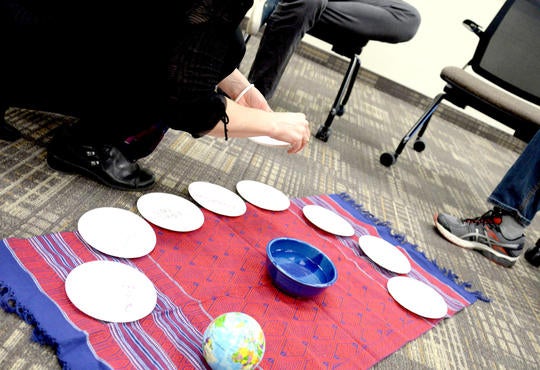At the Intercollegiate Peace Fellowship (ICPF) in February, University of Waterloo and Grebel students took action to promote dialogue on restorative justice in the Waterloo region and beyond. Restorative justice is an alternative conflict resolution method that strives to find meaningful solutions by addressing the needs of victims, offenders, and the greater community harmed by crimes.
“The way you open restorative justice up for people is by talking about it more, creating dialogue, and educating people on how it works,” explained Peace and Conflict Studies (PACS) student Erin Huston. “By having more people explore restorative justice and start to get comfortable with it, it can become a much more mainstream way of approaching conflict,” continued Erin.
Grebel and the PACS Department welcomed students from thirteen schools at the 2018 ICPF conference on the topic of restorative justice. Students attended from Canadian Mennonite University, Goshen College, Bethel College, Hesston College, Eastern Mennonite University, Bluffton College, Mount Royal University, University of Windsor, Guelph University, University of Western Ontario, and University of Waterloo. The conference was organized by a group of Waterloo Arts students passionate about changing perspectives on justice.
“I joined the committee because I think conferences like this are really important and really powerful when they are led by students, for students,” said Erin, who was one of the students on the ICPF planning committee.
The three-day conference featured speakers on several topics, including applications of restorative justice in schools, in prisons, and across cultures.
Chelsea Risser, a student from Goshen College in Indiana attending the conference, took particular interest in the presentation given by Amy Smoke and Christine King from the Waterloo Indigenous Student Centre. They shared their knowledge of restorative justice in an Indigenous context and spoke about how cycles of harm and discrimination against Indigenous peoples arise in the current justice system. “I think it was a good way to incorporate the people whose land this is and other voices that we don’t often hear while talking about restorative justice,” said Chelsea.
“There is a lot more work when taking part in restorative justice,” said Amy Smoke in her presentation. “You have to look within yourself and your values and commit to change.”
The conference also featured a panel of PACS alumni who shared their experiences incorporating the restorative justice principles they learned at UWaterloo into their careers. The panel included Kristina Bartold, Eric Boynton, Scott Morton Ninomiya, and Kimberlee Walker.
Eric, who is a police officer with the Waterloo Regional Police Service, said that learning about restorative justice “made me challenge the traditional thoughts of what justice looked like and what it could look like.”
The Intercollegiate Peace Fellowship conference began in 1948 at Goshen College. It represents peace societies and other peace and justice interested students of Mennonite and other colleges and universities in Canada and the United States. Each year, students organize and host a rotating conference that brings students together to learn from their diverse university experiences.






